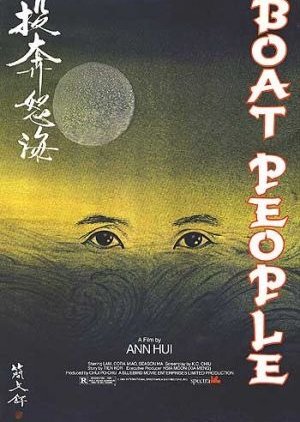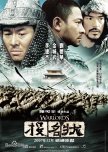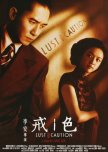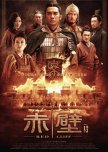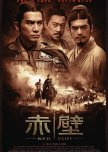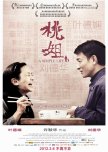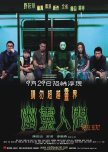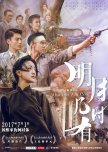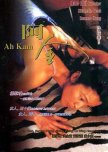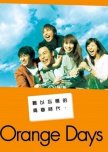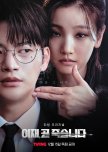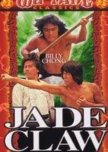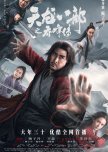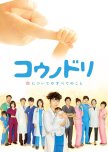
"Run towards the angry sea"
Boat People aka Run Towards the Angry Sea dealt with the brutal years directly following the end of the US/Vietnam War when Ho Chi Min and his party reunified Vietnam. This was the third film Ann Hui directed focusing on Vietnam resulting from stories she had heard while making the previous two. This film told the story of a Japanese reporter and the impoverished children he befriended.Akutagawa Shiomi had reported favorably on Ho Chi Min’s government previously so he was invited three years later to see the country’s progress. His visit to a New Economic Zone is highlighted by happy children singing and greeting him. Not long afterwards he sees people being forcefully removed from their homes. Troops beat first and ask questions later when he photographs horrific scenes. He follows a girl who scooped up noodles from the street and meets her family who are fearful of him. The oldest son tells him he can photograph them on the street for a price. As Akutagawa explores the city and NEZs without his escorts he comes to find that his initial introduction had been a show and that numerous people were willing to risk anything to flee their fates.
I’m old enough to remember the humanitarian crisis of the Boat People when nearly 300,000 people died at sea. This film did not focus on the boat people but rather the circumstances that drove people to make such a dire decision. The New Economic Zones were home to “bad elements” which could simply mean having been a capitalist or having contact with western countries or having wrong ideas by virtue of living in the south. Clearing land mines or farming in remote, inhospitable conditions was not a future many people had envisioned.
George Lam played reporter Akutagawa. He gave a strong performance as a left leaning reporter whose eyes were gradually opened to the horrors around him. A young Andy Lau played a former translator sentenced to a NEZ who was determined to leave the country before being blown up by a land mine. Newcomer Season Ma was believable as Cam Nuong who did what she needed to do to help her family and also had dreams of her own.
The biggest drawback for me was the lack of a language barrier. For the most part, everyone spoke Cantonese. And while there was a segment of the society that was ethnic Chinese, the Hao, who suffered greatly under the new regime, that didn’t seem to be the case here. Lam and his buddy Inoue’s Japanese didn’t sound very authentic, but I’m hardly an expert. I also had a hard time watching Akutagawa use his camera in the pouring rain. Not sure his camera would have survived the punishment he put it through.
While Ann Hui attempted to be apolitical, this time in Vietnam’s history could easily have been a criticism of any totalitarian regime that shut down free thinking and punished those who were seen as suspicious or disloyal. The terrible conditions left from decades at war were also visible. Land mines and unexploded ordinances took their toll as much as the unsympathetic party in control. The film was not an indictment on Vietnam in our present but on a specific time in its turbulent history and the price some people paid for not being on the winning side.
Boat People won numerous Hong Kong Film Awards including Best Picture and Best Director. The transformation of Akutagawa as he went from the idealized version of events to the harsh reality was poignant. The asexual friendship that developed between him and Cam Nuong which went from caution and suspicion to acceptance and compassion also hit the right notes. Without any spoilers, Boat People was tragic and heartbreaking on many levels yet also showed the determination and resiliency of the human spirit.
28 November 2024
Triggers: Deaths from many different graphic sources. Sexual content was alluded to but not shown.
Cet avis était-il utile?

Tragic on so many levels
If you are not ready for indiscriminate mass murder, torture, and suggested prostitution, then this really might make you uncomfortable. To be honest I watched this with family, which made the journey a little bit more bearable. This director is a master at crafting realistic stories and showing every facet of human beings.Set in the aftermath of the Vietnam War, Chinese have controlled Ho Chi Mihn era Vietnam, and the poor non-Communist families suffer many brutalities. Unable to eat and unable to speak with foreigners, the tragedies of Vietnam post-war are illustrated here through the lens of a Japanese reporter.
The Plot: centers the reporter and his interactions with an impoverished family specifically a young girl and her brothers. He witnesses their everyday life and the brutalities the Chinese Army visited upon innocent men, women, and children in Vietnam. The movie is not gorey nor does it show sexual promicuousness (no sex scenes) but these are heavily implied.
The Pacing: It is a relatively slow movie, but it is not boring in any way. The brutality and tragedies we see on the screen are gripping, and the relationships we see are heart-wrenching.
The Acting: Easily some of the best child-actors in the world.
This movie cannot be missed if you enjoy Hong Kong films. It's dark, gritty, sad, and not for the faint of heart.
Cet avis était-il utile?

